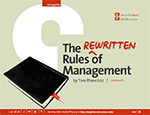 The Big Moo is a book that I found refreshing, both in format and in content. It had many authors, each with their own story and that was part of what made it compelling. After the read I started looking up the authors of interest and landed on Amit Gupta’s blog. Amit has been involved with several ventures, one of them called ChangeThis.com.
The Big Moo is a book that I found refreshing, both in format and in content. It had many authors, each with their own story and that was part of what made it compelling. After the read I started looking up the authors of interest and landed on Amit Gupta’s blog. Amit has been involved with several ventures, one of them called ChangeThis.com.
ChangeThis starts with the premise, that in a world of brief MTV moments, where the attention span of almost every modern human would qualify for Ritalin, there are actually people who have a voice, an argument, one that is well thought out and crafted to be declared a manifesto. Manifestos worthy of reading will propagate organically through the digital waves into the hands of people that get turned on by thinking and possibly changing their point of view. Published in Adobe Acrobat format means virtually universal accessibility. The design, common across all manifestos, is easy to read on digital screens. Each inherits the same navigation and focus on the content. The best part is that ChangeThis is not about making a buck, something that is rare in our jazzed Web 2.0 sphere.
While my blogging is not habitual, this certainly was a delayed post. It came inspired by a most recent The Rewritten Rules of Management by Tom Ehrenfeld. Funny enough, Ehrenfeld rated Moo a “B,†which is actually quite fair– it probably depends on how any one of the 33 stories impacts the reader. The person that gained irreversible insight probably gave it an “A+.†The manifesto is about Bill Swanson’s recent plagiarism. Which reminded me of an article in the Communications of the ACM, “Plagiarism on the Rise†by Ronald Boisvert and Mary Jane Irwin. It discusses the general reasons for the increase in plagiarism and introduces the new ACM Plagiarism Policy. One would think it goes without saying that taking another persons work and calling it your own is problematic. In fact, I thought this type of behavior was already prohibited in the ACM Code of Ethics under the section of honesty. Conceiving and nurturing an original idea is hard work and for some impossible.
A professor once told me, there are no new ideas, and for the ones that are genuine there is someone on the other side of the world that thought of the same thing at the same second and its all a race to see who is capable of communicating it first. I have seen so many people hand me documents that were from a website verbatim, that I think it might actually be part of a new generation of thought – why actually try to think when others have thought for you… just remember to give credit to the people who took the time to think. And, by the way, Ehrenfeld’s manifesto is about a “B.†It could have been shorter, tighter and delivered with more consequence.

